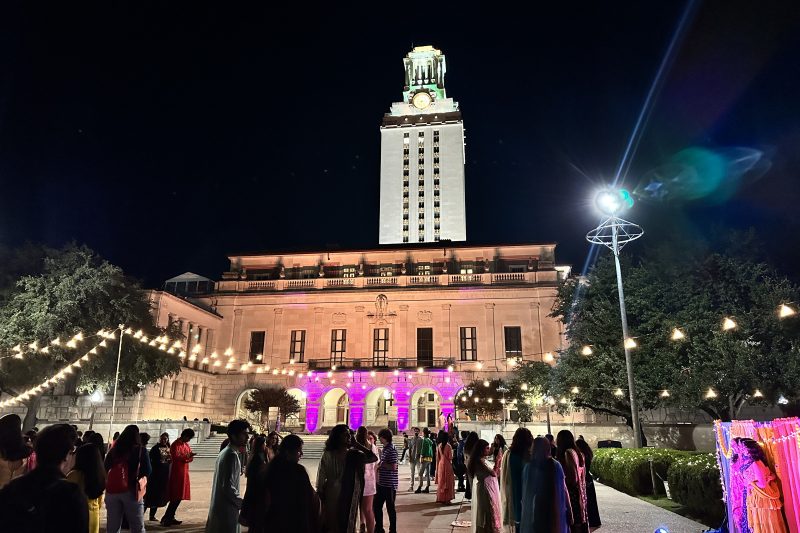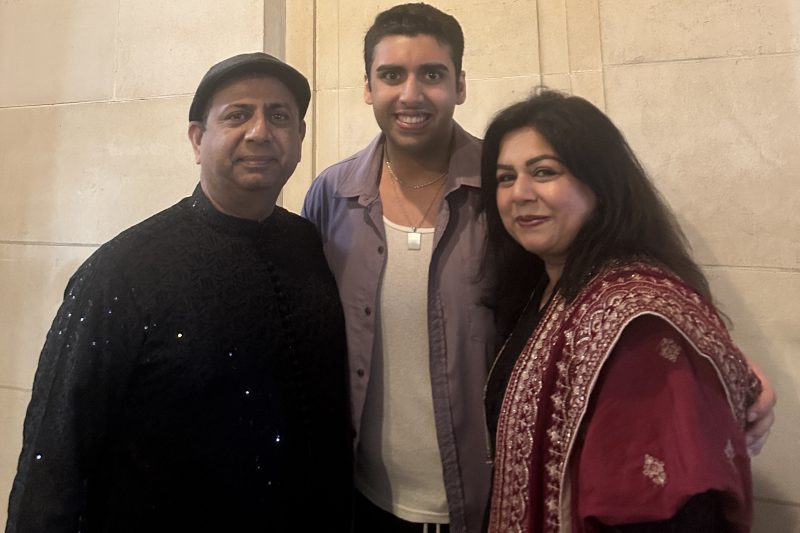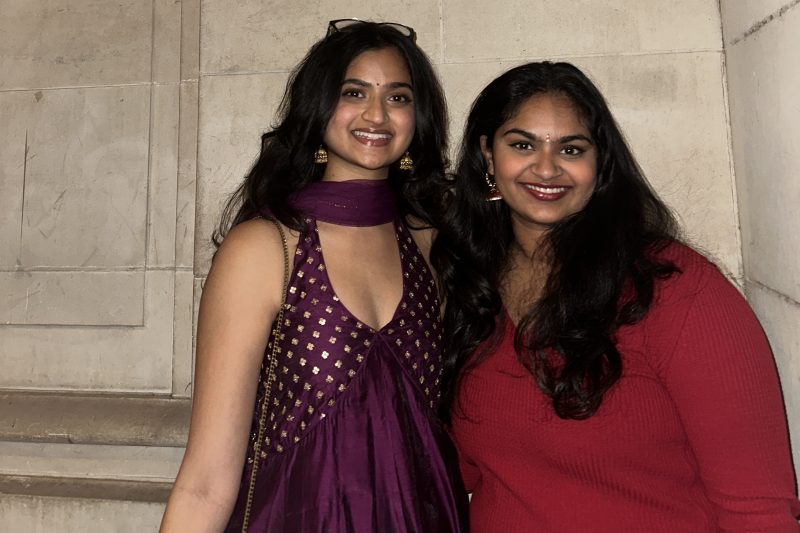UT Students Celebrate Hindu Festival of Lights
By Meg Gross
Reporting Texas TV
AUSTIN, Texas – Vibrant lights, Bollywood dancers, and melodic songs charged the atmosphere in front of the UT Tower on Nov. 15 for UT’s 15th annual Diwali event.
Diwali is an ancient Hindu festival that stems from a Hindu legend involving the hero Rama. The tradition is based on a major story in the Ramayana, a Sanskrit epic from ancient India, which involves Rama saving his wife from a demon holding her hostage.
Arjun Beliamkonda, a co-president of the University of Texas Longhorn Hindu Students Association (UTLHSA), said the lights that are prevalent throughout the festival symbolize the story of the rescue of Rama’s wife.
“To help save her, a lot of people help build a bridge because he has to cross towards an island to save her from captivity, and that bridge is completely lit up with lights, so as he is returning back home, it is a celebration of that success,” Beliamkonda said.
“There are a lot of lights represented to be good over evil. That is one of the main themes of Diwali. So that’s why there’s a lot of fireworks, and then we do sparklers.”
UT Diwali began with an educational portion so those who were not raised in Hindu environments could fully understand the background of the festival.
“If you’re not familiar with Diwali or Hinduism in general, we want to include that part so anybody can join the event,” Beliamkonda said.
After the presentation, a variety of performers displayed their talents, ranging from Bollywood-style dance routines to solo performances.

Students wait for Diwali festivities to begin in front of the UT Tower in Austin, Texas, on Wednesday, Nov. 15, 2023. (Meg Gross/Reporting Texas TV)
The dancers included Texas Dhoum, a co-ed, non-competitive, Bollywood dance team of UT students.
Kabir Sohani is in his first year on the team. Sohani is Muslim but said the festival does a great job of being inclusive for non-Hindus.
“UT Diwali is a great opportunity for all of us to come together – no matter what your religion or ethnicity is – for us to just come and celebrate the festival of lights and our culture, our beautiful culture,” Sohani said.
Sohani’s parents also attended the festival. His mother, Zahida, was born in India and expressed enthusiasm about seeing him perform and represent Indian culture at UT.
“Diwali is a big festival in India that everybody celebrates, and we enjoy that festival, and we are happy to be here,” she said.

The parents of Kabir Sohani (center) came to UT Diwali to watch him dance with UT Dhoum. (Meg Gross/Reporting Texas TV)
Other attendees shared similar sentiments and were delighted to experience a taste of India in Austin.
Samyuktha Saiganesh, a senior at UT from southern India, practices Hinduism and was raised celebrating Diwali.
“It is a very bright celebration in our culture,” Saiganesh said.
“It means expelling all the darkness in our household. When I am at my home, we clean and we wash ourselves. We eat a lot of sweets and snacks, and we listen to a lot of music. We watch movies. We have a lot of fun.”
Saiganesh said she finds comfort in having a piece of Indian culture on UT campus.
“I feel like it’s really fun because it’s nice to see other people that are part of my culture around. It might not be the exact same as it is at home but it definitely feels like a more college version of how Diwali is,” she said.
Varsha Devulapalli is from Southern India and also observes Diwali every year.
“I think what I love about Diwali the most is everyone in your family just gets together, and typically we have little lamps, and we light them together and put them all around the house. It’s always a good way to celebrate,” Devulapalli said.
Although she said UT Diwali is very different from Diwali in Southern India, Devulapalli loves the opportunity UT Diwali gives to forge new friendships.
“I think here, it’s more about meeting other people. Specifically in UT, I think it’s really nice to see other people who are part of the same culture, and celebrate with them,” Devulapalli said.

Varsha Devulapalli (left) and Samyuktha Saiganesh enjoy a night of festivities at UT Diwali in Austin, Texas, on Wednesday, Nov. 15, 2023. (Meg Gross/Reporting Texas TV)
Beliamkonda said granting Hindu-practicing students the chance to come together and celebrate a foundational holiday was a very significant aspect of UT Diwali.
“Having the Diwali celebration on UT campus is really important for a lot of Indian students that are not able to celebrate with their families at home since they are not from Austin. I think that is the most important thing about our festival- giving those students a chance to celebrate on campus,” Beliamkonda said.
He said it is the primary reason he joined UTLHSA.
“I grew up Hindu. My parents go to temple and everything. It’s been a part of my life, and I wanted to continue having that religious aspect during college as well,” Beliamkonda said.
He is not only able to experience the religious aspect of Diwali at UT, but plays a huge role in enabling it to come to fruition, through general meetings for UTLHSA and the event itself.
UTLHSA has general meetings every Tuesday, with two presenters discussing topics in Hinduism each session.
“It is to educate people about different aspects of our culture while also giving them an opportunity to learn about how they can apply Hinduism to their daily lives in college,” Beliamkonda said.
He said these efforts are worthwhile, even though it requires a lot of steps to put together.
“A lot of it is contacting different vendors that are involved in the event. So we have people who are working on the sound, coordinating with them on exactly what equipment we will need, and how much it’s gonna cost, and how much time it is gonna take. We do that for sound, lighting, and fireworks,” Beliamkonda said.
“We also do it for our vendors who help provide the stage and the table, as well as with the dance teams to figure out how long their performances are, and what equipment they might specifically need.”
UT Diwali ended with sparklers, an array of fireworks, and a Bollywood dance party.